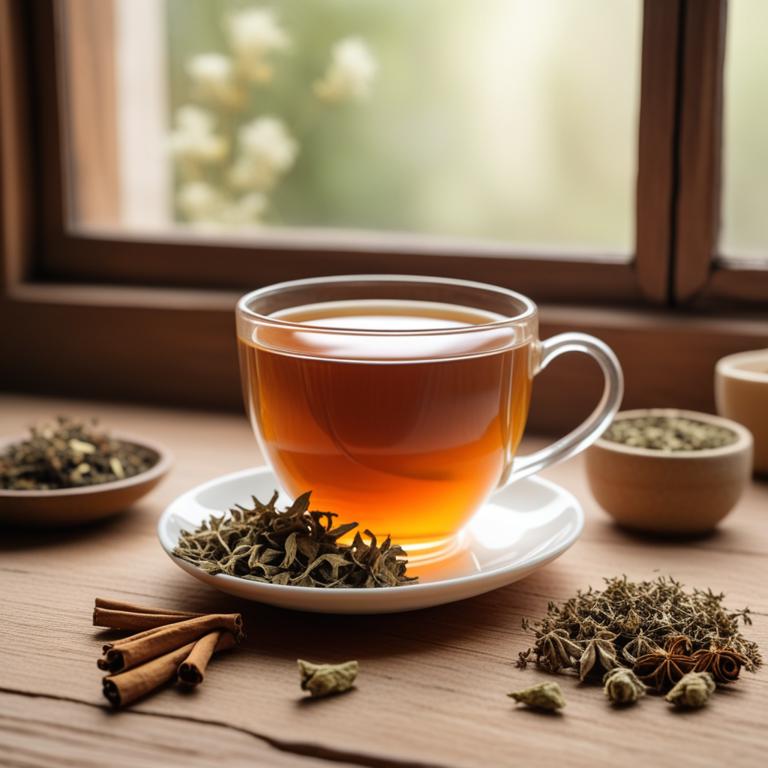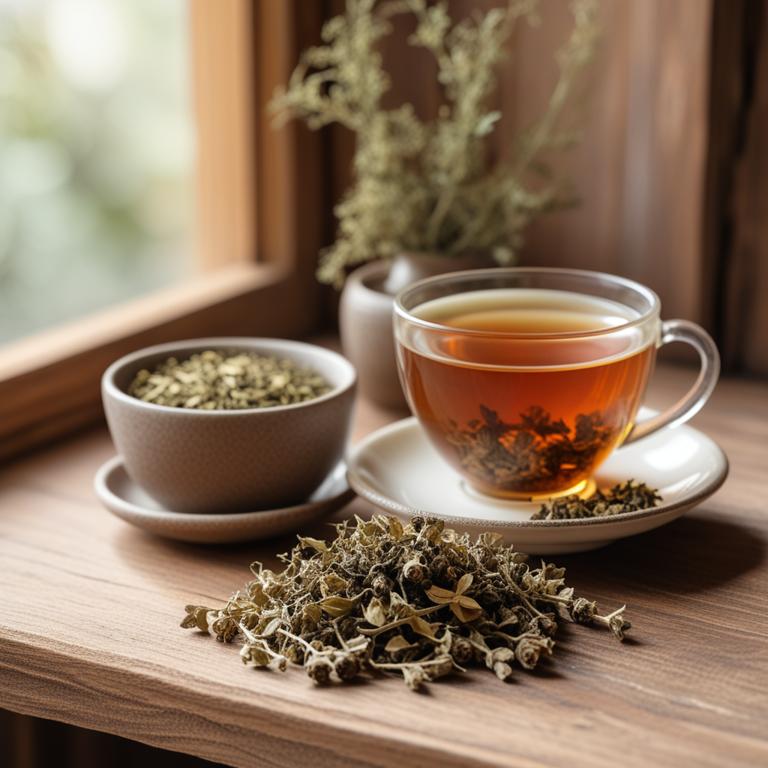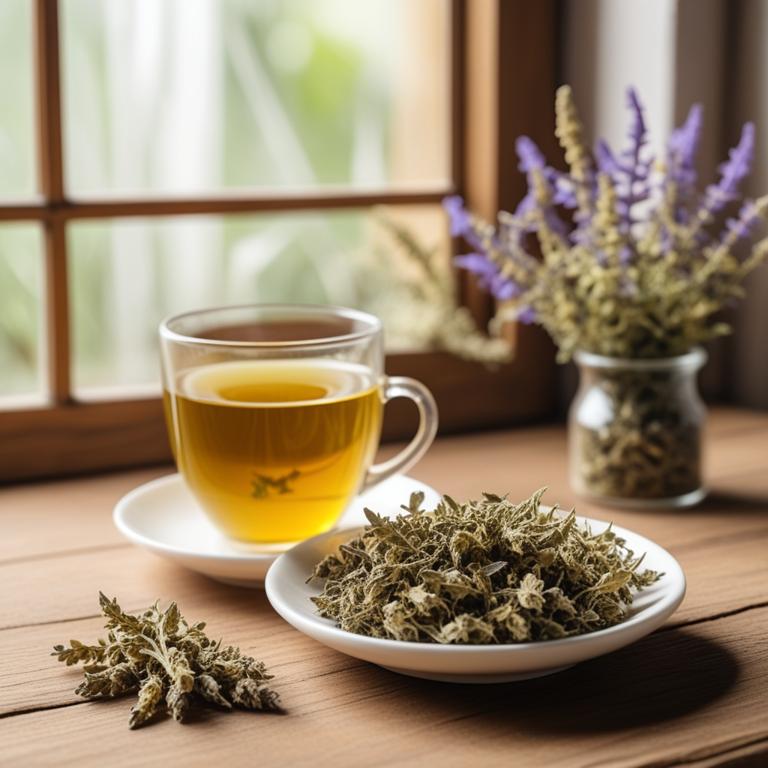9 Best Herbal Teas For Hyperacidity

Herbal teas for hyperacidity are a natural and effective remedy that involves brewing various herbs to alleviate the symptoms of excessive stomach acid production.
These teas work by either neutralizing the acid, reducing its production, or soothing the digestive system to ease discomfort.
Examples of herbal teas used to treat hyperacidity include peppermint tea, which helps relax the digestive muscles and reduce inflammation; ginger tea, which has anti-inflammatory properties that aid digestion; licorice root tea, which has natural antacids that neutralize stomach acid; chamomile tea, which soothes the stomach and promotes relaxation; fennel tea, which eases digestive discomfort and gas; and dandelion root tea, which helps stimulate digestion and reduce bloating.
By incorporating these herbal teas into their daily routine, individuals can find relief from hyperacidity symptoms and promote overall digestive health.
According to "Journal of medicinal food", teas for hyperacidity may be beneficial, as a tea made from the leaves of Cenostigma macrophyllum Tul. var. acuminata Teles Freire, known as Cm-tea, promoted a protective effect against gastric ulcers and exhibited significant healing effects in both in vivo and in vitro models.
Below there's a list of the 9 best herbal teas for hyperacidity.
- 1. Zingiber officinale teas
- 2. Zanthoxylum bungeanum teas
- 3. Scutellaria baicalensis teas
- 4. Curcuma longa teas
- 5. Glycyrrhiza glabra teas
- 6. Zanthoxylum schinifolium teas
- 7. Ligusticum chuanxiong teas
- 8. Ginkgo biloba teas
- 9. Panax ginseng teas
Also you may be interested in...
TODAY'S FREE BOUNDLE
Herb Drying Checklist + Herbal Tea Shopping List + Medicinal Herbs Flashcards
Enter you best email address below to receive this bundle (3 product valued $19.95) for FREE + exclusive access to The Aphotecary Letter.
$19.95 -> $0.00
1. Zingiber officinale teas

Zingiber officinale teas, also known as ginger tea, have been used for centuries to treat hyperacidity ailments due to their anti-inflammatory and antioxidant properties.
The bioactive constituents present in ginger tea, such as gingerols and shogaols, help to alleviate hyperacidity by reducing inflammation in the stomach and promoting digestion.
By inhibiting the production of acid in the stomach and enhancing the functioning of digestive enzymes, ginger tea helps to treat hyperacidity and provide relief from symptoms such as heartburn and bloating.
The benefits of using ginger tea to treat hyperacidity include reduced acid production, improved digestion, and a decrease in the risk of complications such as gastritis and ulcers.
2. Zanthoxylum bungeanum teas

Zanthoxylum bungeanum teas, derived from the Chinese prickly ash plant, have been traditionally used to treat hyperacidity due to its unique properties that help alleviate stomach discomfort and promote digestive health.
The herbal preparation's ability to reduce inflammation and neutralize stomach acid makes it an effective remedy for individuals suffering from hyperacidity.
Bioactive constituents such as ferulic acid, caffeic acid, and isorhapontigenin present in Zanthoxylum bungeanum teas exhibit antioxidant and anti-inflammatory properties, which contribute to its therapeutic effects in treating hyperacidity.
Regular consumption of Zanthoxylum bungeanum teas can provide relief from hyperacidity symptoms, promote stomach balance, and enhance overall digestive well-being.
3. Scutellaria baicalensis teas

Scutellaria baicalensis teas, also known as Huang-qin tea, have been traditionally used to treat hyperacidity ailments due to their anti-inflammatory, antioxidant, and carminative properties.
The bioactive constituents of Scutellaria baicalensis teas, including baicalin, baicalein, and wogonin, have been found to help neutralize stomach acid, reduce inflammation, and protect the mucous membrane of the stomach, thereby alleviating symptoms of hyperacidity.
The flavonoids present in Scutellaria baicalensis teas help to increase the mucus secretion in the stomach, forming a protective barrier against acid damage, and also exhibit anti-gastric acid secretion properties, which help to reduce the production of excess stomach acid.
Regular consumption of Scutellaria baicalensis teas has been found to provide relief from hyperacidity symptoms, such as heartburn, bloating, and nausea, and can be a beneficial addition to a treatment plan for this ailment.
Related Study
According to "PloS one", Scutellaria baicalensis teas for hyperacidity may be beneficial due to the presence of free flavonoids such as baicalin, baicalein, and wogonin, which exhibit high antioxidant activities and can potentially help eliminate reactive oxygen species associated with hyperacidity.
4. Curcuma longa teas

Curcuma longa teas have been used for centuries to treat hyperacidity, a condition characterized by excessive stomach acid production.
This herbal preparation helps to treat the ailment by reducing inflammation and alleviating digestive issues due to its anti-inflammatory properties.
Curcuma longa teas contain bioactive constituents such as curcumin, demethoxycurcumin, and bisdemethoxycurcumin, which have been shown to exhibit anti-inflammatory and antioxidant activities that help to neutralize stomach acid and soothe the digestive system.
The benefits of consuming Curcuma longa teas to treat hyperacidity include reduced symptoms of heartburn and acid reflux, improved digestion, and enhanced overall well-being.
Related Study
According to "Biological trace element research", Curcuma longa teas for hyperacidity may be beneficial due to the presence of antioxidants and inhibitory action against most bacterial strains, particularly S. aureus, K. pneumonia, and P. aeruginosa, which can contribute to gastrointestinal infections and potentially alleviate hyperacidity.
5. Glycyrrhiza glabra teas

Glycyrrhiza glabra teas, also known as licorice root tea, have been used for centuries to treat hyperacidity ailments due to their anti-inflammatory and antacid properties.
This herbal preparation helps to treat hyperacidity by coating the stomach lining with its protective compounds, thereby reducing inflammation and preventing acid secretion.
The bioactive constituents of Glycyrrhiza glabra teas, including glycyrrhizin and flavonoids, have been found to exhibit potent antioxidant and anti-ulcerative activities, which contribute to its therapeutic effects.
Regular consumption of Glycyrrhiza glabra teas can provide numerous benefits in treating hyperacidity, including reduced stomach pain, improved digestion, and a decrease in symptoms of acid reflux.
6. Zanthoxylum schinifolium teas

Zanthoxylum schinifolium teas have been traditionally used to treat hyperacidity, a common gastrointestinal disorder characterized by excessive production of stomach acid.
The anti-inflammatory and antioxidant properties of this herbal preparation help to alleviate symptoms of hyperacidity by reducing inflammation and neutralizing free radicals in the stomach.
The bioactive constituents of Zanthoxylum schinifolium, including flavonoids, phenolic acids, and coumarins, play a crucial role in its therapeutic effects by regulating stomach acid secretion and promoting the healing of gastric mucosa.
Regular consumption of Zanthoxylum schinifolium teas has been found to provide relief from hyperacidity symptoms, improve digestion, and promote overall gut health.
7. Ligusticum chuanxiong teas

Ligusticum chuanxiong teas have been traditionally used to treat hyperacidity, a condition characterized by excessive stomach acid production.
The antispasmodic and anti-inflammatory properties of this herbal preparation help to alleviate symptoms of hyperacidity, such as heartburn and acid reflux.
The bioactive constituents, including ferulic acid and ligustilide, found in Ligusticum chuanxiong teas, have been shown to inhibit the production of stomach acid and protect the mucous membrane of the stomach.
Regular consumption of Ligusticum chuanxiong teas has been found to provide relief from hyperacidity symptoms and promote overall digestive health.
8. Ginkgo biloba teas

Ginkgo biloba teas have been traditionally used to treat hyperacidity ailments due to their anti-inflammatory and antioxidant properties, which help to reduce inflammation and neutralize free radicals in the body.
The flavonoids and terpenoids present in Ginkgo biloba teas, such as quercetin and bilobalide, have been shown to help alleviate symptoms of hyperacidity by reducing acid production and improving digestion.
The bioactive constituents of Ginkgo biloba teas, including flavonoids and terpenoids, help to treat hyperacidity by protecting the mucous membranes in the stomach and reducing inflammation, thereby providing relief from symptoms such as heartburn and acid reflux.
Regular consumption of Ginkgo biloba teas has been found to provide benefits in treating hyperacidity ailments, including reduced frequency and severity of symptoms, improved digestion, and enhanced overall well-being.
9. Panax ginseng teas

Panax ginseng teas have been traditionally used to treat hyperacidity ailments due to their anti-inflammatory and antioxidant properties, which help to soothe the stomach lining and reduce inflammation.
The bioactive constituents of Panax ginseng, such as ginsenosides and polysaccharides, play a crucial role in alleviating hyperacidity symptoms by regulating the digestive system and enhancing the secretion of digestive enzymes.
Regular consumption of Panax ginseng teas has been found to help alleviate symptoms of hyperacidity, including heartburn and acid reflux, by promoting a balance of gut bacteria and improving the overall gut health.
The benefits of using Panax ginseng teas to treat hyperacidity ailments include reduced symptoms, improved digestion, and enhanced overall well-being.